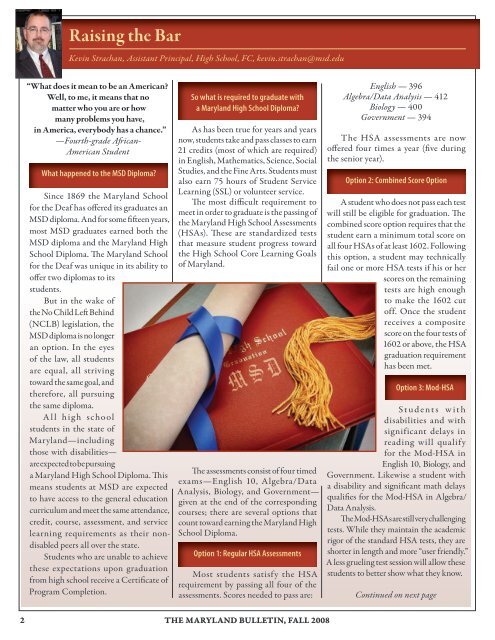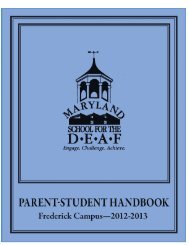Create successful ePaper yourself
Turn your PDF publications into a flip-book with our unique Google optimized e-Paper software.
Raising <strong>the</strong> Bar<br />
Kevin Strachan, Assistant Principal, High <strong>School</strong>, FC, kevin.strachan@msd.edu<br />
“What does it mean to be an American?<br />
Well, to me, it means that no<br />
matter who you are or how<br />
many problems you have,<br />
in America, everybody has a chance.”<br />
—Fourth-grade African-<br />
American Student<br />
What happened to <strong>the</strong> MSD Diploma?<br />
Since 1869 <strong>the</strong> <strong>Maryland</strong> <strong>School</strong><br />
<strong>for</strong> <strong>the</strong> <strong>Deaf</strong> has offered its graduates an<br />
MSD diploma. And <strong>for</strong> some fifteen years,<br />
most MSD graduates earned both <strong>the</strong><br />
MSD diploma and <strong>the</strong> <strong>Maryland</strong> High<br />
<strong>School</strong> Diploma. The <strong>Maryland</strong> <strong>School</strong><br />
<strong>for</strong> <strong>the</strong> <strong>Deaf</strong> was unique in its ability to<br />
offer two diplomas to its<br />
students.<br />
But in <strong>the</strong> wake of<br />
<strong>the</strong> No Child Left Behind<br />
(NCLB) legislation, <strong>the</strong><br />
MSD diploma is no longer<br />
an option. In <strong>the</strong> eyes<br />
of <strong>the</strong> law, all students<br />
are equal, all striving<br />
toward <strong>the</strong> same goal, and<br />
<strong>the</strong>re<strong>for</strong>e, all pursuing<br />
<strong>the</strong> same diploma.<br />
All high school<br />
students in <strong>the</strong> state of<br />
<strong>Maryland</strong>—including<br />
those with disabilities—<br />
are expected to be pursuing<br />
a <strong>Maryland</strong> High <strong>School</strong> Diploma. This<br />
means students at MSD are expected<br />
to have access to <strong>the</strong> general education<br />
curriculum and meet <strong>the</strong> same attendance,<br />
credit, course, assessment, and service<br />
learning requirements as <strong>the</strong>ir nondisabled<br />
peers all over <strong>the</strong> state.<br />
Students who are unable to achieve<br />
<strong>the</strong>se expectations upon graduation<br />
from high school receive a Certificate of<br />
Program Completion.<br />
So what is required to graduate with<br />
a <strong>Maryland</strong> High <strong>School</strong> Diploma?<br />
As has been true <strong>for</strong> years and years<br />
now, students take and pass classes to earn<br />
21 credits (most of which are required)<br />
in English, Ma<strong>the</strong>matics, Science, Social<br />
Studies, and <strong>the</strong> Fine Arts. Students must<br />
also earn 75 hours of Student Service<br />
Learning (SSL) or volunteer service.<br />
The most difficult requirement to<br />
meet in order to graduate is <strong>the</strong> passing of<br />
<strong>the</strong> <strong>Maryland</strong> High <strong>School</strong> Assessments<br />
(HSAs). These are standardized tests<br />
that measure student progress toward<br />
<strong>the</strong> High <strong>School</strong> Core Learning Goals<br />
of <strong>Maryland</strong>.<br />
The assessments consist of four timed<br />
exams—English 10, Algebra/Data<br />
Analysis, Biology, and Government—<br />
given at <strong>the</strong> end of <strong>the</strong> corresponding<br />
courses; <strong>the</strong>re are several options that<br />
count toward earning <strong>the</strong> <strong>Maryland</strong> High<br />
<strong>School</strong> Diploma.<br />
Option 1: Regular HSA Assessments<br />
Most students satisfy <strong>the</strong> HSA<br />
requirement by passing all four of <strong>the</strong><br />
assessments. Scores needed to pass are:<br />
2 THE MARYLAND BULLETIN, FALL <strong>2008</strong><br />
English — 396<br />
Algebra/Data Analysis — 412<br />
Biology — 400<br />
Government — 394<br />
The HSA assessments are now<br />
offered four times a year (five during<br />
<strong>the</strong> senior year).<br />
Option 2: Combined Score Option<br />
A student who does not pass each test<br />
will still be eligible <strong>for</strong> graduation. The<br />
combined score option requires that <strong>the</strong><br />
student earn a minimum total score on<br />
all four HSAs of at least 1602. Following<br />
this option, a student may technically<br />
fail one or more HSA tests if his or her<br />
scores on <strong>the</strong> remaining<br />
tests are high enough<br />
to make <strong>the</strong> 1602 cut<br />
off. Once <strong>the</strong> student<br />
receives a composite<br />
score on <strong>the</strong> four tests of<br />
1602 or above, <strong>the</strong> HSA<br />
graduation requirement<br />
has been met.<br />
Option 3: Mod-HSA<br />
Students with<br />
disabilities and with<br />
significant delays in<br />
reading will qualify<br />
<strong>for</strong> <strong>the</strong> Mod-HSA in<br />
English 10, Biology, and<br />
Government. Likewise a student with<br />
a disability and significant math delays<br />
qualifies <strong>for</strong> <strong>the</strong> Mod-HSA in Algebra/<br />
Data Analysis.<br />
The Mod-HSAs are still very challenging<br />
tests. While <strong>the</strong>y maintain <strong>the</strong> academic<br />
rigor of <strong>the</strong> standard HSA tests, <strong>the</strong>y are<br />
shorter in length and more “user friendly.”<br />
A less grueling test session will allow <strong>the</strong>se<br />
students to better show what <strong>the</strong>y know.<br />
Continued on next page






